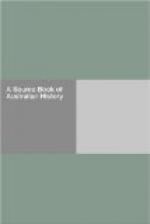June 8th. This morning the winds set in foul for Indented Heads, and, having made several attempts to get out of the river, we gave it up as hopeless. We went in the boat, up the large river coming from the east, and after examination six miles up, I was pleased to find the water quite fresh and very deep. This will be the place for the future village.
TRANSPORTATION
+Source.+—Report from the Select Committee of the House of Commons on Transportation (Molesworth, 1838), pp. 8-10, 31-33, 43
As Australia was shown to offer greater and greater attractions to free settlers the agitation against transportation increased. In 1838 the British Government appointed a Select Committee to inquire into and report upon the whole system. Their verdict is given below.
To plant a colony, and to form a new society, has ever been an arduous task. In addition to the natural difficulties arising from ignorance of the nature of the soil, and of the climate of a new country, the first settlers have generally had to contend with innumerable obstacles, which only undaunted patience, firmness of mind, and constancy of purpose, could overcome. But, whatever the amount of difficulties attendant on the foundations of colonies, those difficulties were greatly augmented, in New South Wales, by the character of the first settlers. The offenders who were transported in the past century to America, were sent to communities the bulk of whose population were men of thrift and probity; the children of improvidence were dropped in by driblets amongst the mass of a population already formed, and were absorbed and assimilated as they were dropped in. They were scattered and separated from each other; some acquired habits of honest industry, and all, if not reformed by their punishment, were not certain to be demoralized by it. In New South Wales, on the contrary, the community was composed of the very dregs of society; of men, proved by experience to be unfit to be at large in any society, and who were sent from the British gaols,




